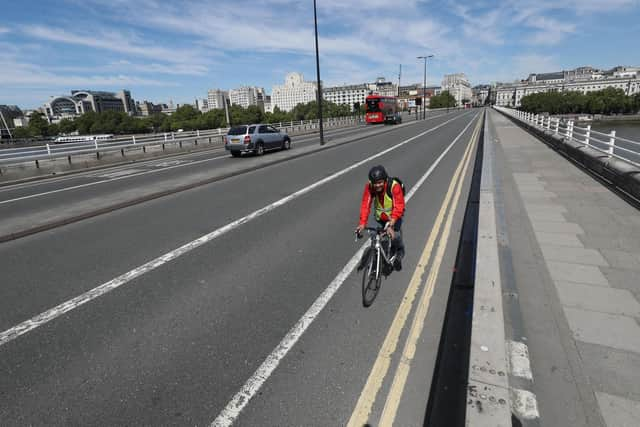Active travel must be the focus after lockdown eases - Julian Pearce
While making changes to the workplace can be relatively straightforward for many – and having a physical workplace will remain crucial for the majority of firms – the commute can be an altogether more vexing issue.
Concerns around public transport are writ large across the minds of many employers and employees. Anyone who has endured a rush-hour commute on the Wharfedale line into Leeds, or the morning crush on the way into Bradford or Sheffield, will know that social distancing on our current infrastructure is pure fantasy.
Advertisement
Hide AdAdvertisement
Hide AdMany will understandably be nervous about returning to public transport, in the short term at least. This is likely to drive those who are able, back onto the roads and back into cars – one of the most inefficient forms of transport from a time, space, money and environmental point of view. This could result in gridlock for many towns and cities.


Transport policy has switched focus over recent years to public transport and active forms of travel, but perhaps now is the time to make active travel functional, rather than aspirational.
The goalposts have shifted, and in order to ensure we return to a level of normality and national profitability as soon as practicable, we must act together.
I have cycled into work for years, as have many of my friends who work in Leeds. I personally cycle the eight miles into the centre because it’s by far the fastest way to make the journey, and it allows me to make good use of my time – combining my commute with daily exercise.
Advertisement
Hide AdAdvertisement
Hide AdHowever, we must respect that everyone’s choices for the way they travel are particular to them. Someone travelling between Harrogate and York might have, for environmental reasons, swapped their car for a train.
One of the heartening things about lockdown has been the value placed by individuals on their physical well-being. The Transport Minister Grant Shapps has talked of the numbers cycling rising by hundreds of percentage points, and anecdotally speaking, I’ve seen many more people biking on the canal towpaths, on bridleways, through the local woods, or, indeed, on the roads.
If you look at many other European cities, people on bikes come in all shapes, sizes and styles. It’s merely a way to get about and one that is being recognised by the most forward-thinking experts (architecture and built environment firms must come in for particular praise).
If this situation acts as a catalyst, the shift must be supported by policymakers. In France, the government has just launched a €20m scheme whereby citizens are encouraged to get on their bike with a €50 grant for repairs, training or storage.
Advertisement
Hide AdAdvertisement
Hide AdRather than retrofitting outdated infrastructure – do something that actively encourages participation.
Active travel must not only be seen as convenient and healthy, but preferable. A lot has been made of ‘the new normal’ but cycling, walking or jogging will never be ‘normal’ until it is more convenient.
Comment Guidelines
National World encourages reader discussion on our stories. User feedback, insights and back-and-forth exchanges add a rich layer of context to reporting. Please review our Community Guidelines before commenting.